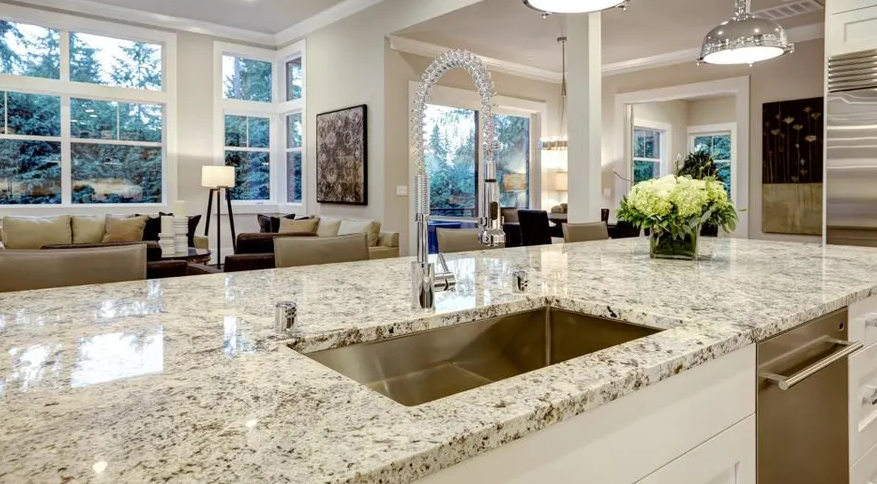Key Takeaways
- Learn about different countertop materials and their pros and cons.
- Understand critical factors to consider when selecting a countertop.
- Discover practical tips to maintain and extend the life of your countertop.
Table of Contents
- Choosing the Right Countertop Material
- Factors to Consider When Choosing a Countertop
- Practical Maintenance Tips for Your Countertop
- Budgeting for Your Countertop Project
- Considering the Environmental Impact
Choosing the Right Countertop Material
Many countertop materials are available, each offering unique benefits and aesthetic appeal. Popular choices include granite, quartz, marble, and laminate. Granite is celebrated for its durability and natural beauty, while quartz offers considerable strength and a non-porous surface. Residents looking for countertops Denver might find quartz appealing due to its minimal maintenance needs. This option has proven to be a popular choice among busy families and those who prioritize hygiene. For those seeking luxury, marble is an elegant, albeit high-maintenance, option. Its timeless beauty has graced homes for centuries, though its porous nature makes it prone to stains and scratches. Laminate, however, provides an affordable and versatile alternative that fits well into various kitchen designs. It offers various colors and patterns, enabling homeowners to get creative with their kitchen aesthetics without breaking the bank.
Factors to Consider When Choosing a Countertop
Consider durability, maintenance, cost, and aesthetic appeal when selecting a countertop. Durability is paramount, especially in high-traffic areas. Materials like granite and quartz are renowned for their resilience against daily wear and tear. Households with kids or frequent cooks might benefit from these more complex surfaces, which effectively manage the rigors of kitchen activities. Maintenance is another critical factor. While some surfaces, such as quartz, are low-maintenance and easy to clean, materials like marble require regular sealing and careful handling to avoid damage. Cost is also a significant consideration. Budget constraints can influence the choice of materials, ranging from high-end granite and marble to more budget-friendly alternatives like laminate. Aesthetic appeal must be noticed. The countertop sets the tone for the kitchen’s overall design. Finding a material that compliments your kitchen’s cabinets, flooring, and overall theme is essential. A well-coordinated kitchen enhances functionality and increases the home’s value, making it a worthwhile investment in the long run.
Practical Maintenance Tips for Your Countertop
Proper maintenance can significantly extend the life of your countertop. For instance, regularly sealing granite countertops helps preserve their shine and resist stains. This simple task can be done yearly and maintains the granite’s luster. Maintaining non-porous quartz countertops is more accessible. A simple mixture of dish soap and water usually suffices for cleaning. Avoid using harsh chemicals, which can damage the surface over time.
Additionally, using cutting boards while preparing food protects your countertop from scratches. Always use trivets or hot pads under hot pots and pans to prevent heat damage. Regular cleaning keeps countertops looking new and helps maintain a hygienic kitchen environment, which is crucial for food safety.
Budgeting for Your Countertop Project
Accurate budgeting is essential to a countertop project’s success. Create a thorough budget for labor, materials, and other costs. Including possible overruns and unforeseen expenses is critical so you know exactly where you stand. Following seasoned professionals’ advice on budget planning will help you keep the financial aspects of your project under control. Always ask for numerous quotations to ensure you get the most excellent bargain. Think about the investment’s long-term worth as well as its initial expense. Owing to their longer lifespan and less care needs, higher-quality materials can occasionally cost you more in the long run. When creating your budget, take prospective maintenance and repair costs into account. Over time, these extra expenses may accumulate, creating a cheaper, more expensive option in the long run.
Considering the Environmental Impact
The environmental impact of your countertop choice is increasingly significant. Materials like recycled glass and bamboo are excellent options for eco-conscious homeowners. These materials not only reduce waste but also offer unique aesthetic qualities. Recycled glass countertops, for example, are created using post-consumer materials, giving new life to products that would otherwise end up in landfills. This option combines sustainability with modern design, making it an attractive choice for many homeowners.
Furthermore, it’s beneficial to seek out manufacturers who follow sustainable practices. Sustainable manufacturing processes minimize the environmental footprint of your countertop choice. For instance, some manufacturers use water-based adhesives and finishes, reducing the environmental impact. Examining eco-friendly options can help you make informed decisions. Sustainable choices do not compromise style or function; in fact, they can often enhance the character and story of your design.

